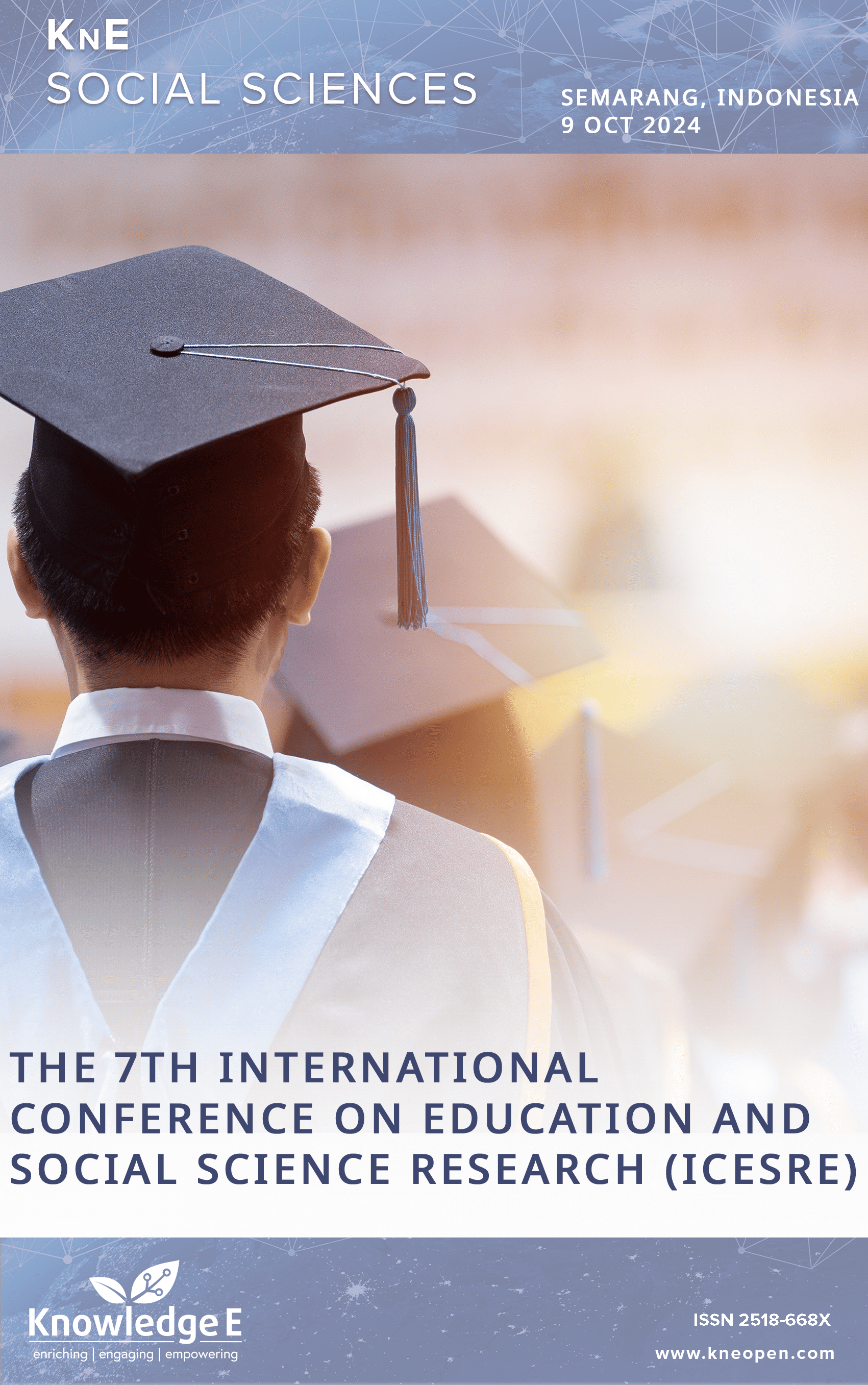ESD-Based Green Chemistry Teaching Materials in High School to Support Sustainability
DOI:
https://doi.org/10.18502/kss.v10i9.18506Keywords:
teaching materials, green chemistry, ESD, high school, sustainabilityAbstract
understand environmental issues and play a role in supporting sustainability. Although the concept of Education for Sustainable Development (ESD) has often been applied in many fields, its application, specifically in green chemistry teaching materials in high school, still receives less attention. Previous studies focus more on the concept of green chemistry in general, so there is still a void in the development of teaching materials specifically designed to support sustainability goals. This study reviews and analyzes various literatures on the development of ESD-based green chemistry teaching materials in high school, evaluating their impact on students’ environmental understanding and critical thinking skills. The method used is Systematic Literature Review (SLR), by reviewing research that has been published between 2018 and 2024. Relevant literature was identified from the Google scholar academic journal database to get a comprehensive view of the implementation of this teaching material. The results of the study show that ESD-based green chemistry teaching materials can increase students’ awareness of environmental issues, encourage them to take concrete actions that support sustainability, and hone their critical thinking skills in understanding the environmental impacts of various chemical processes. Nevertheless, there are challenges in its implementation, such as limited resources for teachers and the need for further training so that teachers are ready to implement this teaching material properly. Overall, this study concludes that ESD-based green chemistry teaching materials have great potential in supporting sustainable learning in high schools. However, further development and stronger support for teacher training and the provision of adequate resources are needed.
References
Althafullayya MR, Al-Qur’an Dan Tafsir I, Ushuluddin U, Islam N, Sultan S, Kasim R. Peran Pendidikan Karakter Untuk Generasi Muda Berdaya Tahan dalam Mendukung Ketahanan Nasional: Analisis Holistik [Internet]. Vol. 2, Journal Education Innovation E-ISSN. 2024. Available from: https://jurnal.ypkpasid.org/index.php/jei
Amorós Molina Á, Helldén D, Alfvén T, Niemi M, Leander K, Nordenstedt H, et al. Integrating the United Nations sustainable development goals into higher education globally: a scoping review. Vol. 16, Global Health Action. Taylor and Francis Ltd.; 2023. https://doi.org/10.1080/16549716.2023.2190649.
Vioreza N, Hilyati W, Lasminingsih M. Education for Sustainable Development: Bagaimana Urgensi dan Peluang Penerapannya pada Kurikulum Merdeka? PUSAKA: Journal of Educational Review [Internet]. 2023;1(1):34–48.
Fahlevi MR. Upaya Pengembangan Number Sense Siswa Melalui Kurikulum Merdeka (2022). Sustainable Jurnal Kajian Mutu Pendidikan. 2022 Jun;5(1):11–27.
Rosa E, Destian R, Agustian A, Wahyudin W. Inovasi Model dan Strategi Pembelajaran dalam Implementasi Kurikulum Merdeka. Vol. 5. J Educ Res. 2024;5(3):2608–17.
Aulia R. Persepsi Mahasiswa Calon Guru Kimia tentang Pendidikan untuk Pembangunan Berkelanjutan. repository.uinjkt.ac.id [Internet]. Available from: https: //repository.uinjkt.ac.id/dspace/handle/123456789/49987
Zuin VG, Eilks I, Elschami M, Kümmerer K. Education in green chemistry and in sustainable chemistry: perspectives towards sustainability. Green Chem. 2021 Feb;23(4):1594–608.
Almuhur E. Effective Teaching Strategies for Integrating ESD into STEM (Science, Technology, Engineering, and Math) in Jordanian Curricula. 2023;18:170–8. Available from: https://doi.org/https://doi.org/10.5281/zenodo.10049652#39.
Permanasari A, Dwi Pursitasari I. Students’ Critical Thinking Skills and Sustainability Awareness in Science Learning for Implementation Education for Sustainable Development. 2021; Available from: http://dx.doi.org/https://doi.org/10.17509/xxxx. vxix.
Sulkipani Habibah SM. Pemberdayaan pendidikan indonesia tren, budaya, dan wawasan. Andriyanto Jusuf Blegur A, editor. LAKEISHA; 2024. 1–249 p.
Priharsari D. SYSTEMATIC LITERATURE REVIEW DI BIDANG SISTEM INFORMASI DAN ILMU KOMPUTER. 2022;9(2):263–8.
Triandini E, Jayanatha S, Indrawan A, Putra GW, Iswara B, Studi P, et al. Metode Systematic Literature Review untuk Identifikasi Platform dan Metode Pengembangan Sistem Informasi di Indonesia [Internet]. Vol. 1, Indonesian Journal of Information Systems (IJIS. Available from: https://www.google.com
Okoli C. A Guide to Conducting a Standalone Systematic Literature Review Chitu Okoli. A Guide to Conducting a Standalone Systematic Literature Review [Internet]. Communications of the Association for Information Systems. 2015. Available from: https://hal.science/hal-01574600v1
Xiao Y, Watson M. Guidance on Conducting a Systematic Literature Review. Vol. 39, Journal of Planning Education and Research. SAGE Publications Inc.; 2019. p. 93–112. https://doi.org/10.1177/0739456X17723971.
Page MJ, McKenzie JE, Bossuyt PM, Boutron I, Hoffmann TC, Mulrow CD, et al. The PRISMA 2020 statement: An updated guideline for reporting systematic reviews. Vol. 372, The BMJ. BMJ Publishing Group; 2021.
Martín-Martín A, Thelwall M, Orduna-Malea E, Delgado López-Cózar E. Google Scholar, Microsoft Academic, Scopus, Dimensions, Web of Science, and OpenCitations’ COCI: a multidisciplinary comparison of coverage via citations. Scientometrics. 2021;126(1):871–906.
Moher D, Shamseer L, Clarke M, Ghersi D, Liberati A, Petticrew M, et al. Preferred reporting items for systematic review and meta-analysis protocols (PRISMA-P) 2015 statement. Revista Espanola de Nutricion Humana y Dietetica. 2016;20(2):148–60.
Snyder H. Literature review as a research methodology: an overview and guidelines. J Bus Res. 2019 Nov;104:333–9.
van Eck NJ, Waltman L. Citation-based clustering of publications using CitNetExplorer and VOSviewer. Scientometrics. 2017;111(2):1053–70.
Braun V, Clarke V. Can I use TA? Should I use TA? Should I not use TA? Comparing reflexive thematic analysis and other pattern-based qualitative analytic approaches. Couns Psychother Res. 2021 Mar;21(1):37–47.

